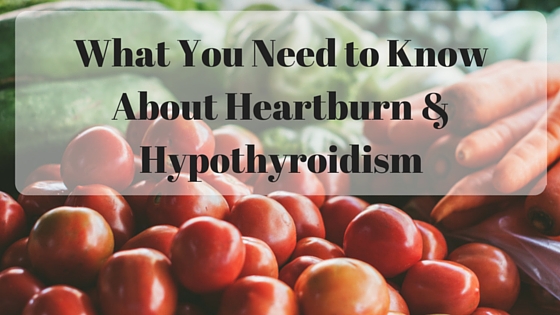Heartburn — that sensation of burning in your chest or throat that may accompany meals or haunt you throughout the day. Chances are you've experienced it at some point, which you means you know how uncomfortable it can be. However, you might be asking yourself right now, what could Hashimoto's or Hypothyroidism and heartburn possibly have in common?
Heartburn is a common condition in general and is often overlooked in the Hashimoto's patient. Why is this? Well, many people view thyroid disorders as conditions that only affect the thyroid. This just isn't true.
Your digestion and thyroid are intimately connected. In fact, your thyroid affects every system in your body and vice-versa. There can be many reasons why someone may experience heartburn, but the most common cause I see is due to low stomach acid.
Wait, isn't stomach acid causing the burn in the first place?
Yes, stomach acid that is allowed to move past the esophageal sphincter (the gatekeeper between your throat and your stomach) causes the burning sensation. But when you have adequate stomach acid, this sphincter will receive a signal to close and not allow the passage of acid or food to make its way into the throat.
When this burning occurs, it is tempting the reach for the antacids. However, the use of antacids and proton pump inhibitors (PPIs) result in an increase in gastric pH, which gives temporary relief, but does not address the root cause of the heartburn, and may make things worse over time. The pH of your stomach should be about 1-2 in range, which is very acidic.
Why does your stomach need to be acidic?
Adequate levels of stomach acid are important for a number of reasons. Let’s go over a few:
- Stomach acid aids in the breakdown and digestion of large food molecules. This step in the digestive process prepares the food for nutrient absorption in the intestine.
- Stomach acid is necessary for mineral and vitamin B12 absorption. These and other nutrients are required to create thyroid hormone. In this way, low stomach acid also can be a cause of anemia, both iron deficiency (microcytic) and vitamin B12 (megaloblastic).
- Your stomach acid is the first line of defense against ingested bacteria and other microorganisms that cause infection. Hashimoto's can be triggered and exacerbated by gut infections.
- Too little stomach acid allows for proteins to travel through the digestive tract into the bloodstream, which can result in leaky gut, trigger autoimmunity, create food sensitivities, and aggravate the immune system.
- Reduced stomach acid has also been shown to decrease absorption of Levothyroxine or synthetic T4. In fact, one study found that autoimmune thyroid patients who also had parietal cell antibodies required 17% more daily T4.(1)
Autoimmunity as the Underlying Cause of Heartburn
It is well known that once a person develops one autoimmune disease they are at about a 25% increased risk for developing another (2). Heartburn can be an early sign of several autoimmune diseases including Sjogren’s, lupus, and celiac disease. It may also be caused by immune system inflammation of the stomach itself.
Autoimmune Metaplastic Atrophic Gastritis (AMAG) is an autoimmune condition in which the immune system attacks your parietal cells and results in decreased stomach acid and intrinsic factor, the protein necessary for the absorption of B12. In addition, antibodies to intrinsic factor may also be present, resulting in pernicious anemia.
One study looking at the prevalence of pernicious anemia in elderly autoimmune thyroid patients, it was found that about 18.6% of patients with autoimmune thyroid disease also had pernicious anemia. In addition, the authors noted that 45% of those with pernicious anemia presented with autoimmune thyroid disease. (3)
If you’ve been experiencing heartburn, I encourage you to meet with a Naturopathic Physician or Functional Medicine Practitioner to understand the root cause of your symptoms. It may be as simple as correcting low stomach acid production or a symptom of a more serious underlying condition.
Lab Testing to Consider
- CBC: If your MCV is >92 this may be a sign of B12 or Folate deficiency
- B12
- Methylmalonic acid
- Folic acid
- Anti-Parietal cell Antibodies (PCA)
- Anti-Intrinsic Factor Antibodies (IFA)
- Anti-Helicobacter pylori Antibodies
- Gastrin
5 Steps to Prevent and Relieve Heartburn Without Using Antacids
- Avoid drinking water with meals. This can make symptoms worse.
- Deglycyrrhizinated licorice (DGL) chews. This form of licorice relieves heartburn and has been shown to reduce ulcers. Take 1-2 chews prior to meals or with onset of symptoms.
- Apple cider vinegar or lemon juice before meals. Try 1-2 tsp. of either in a small glass of water 15 minutes before meals. This will help stimulate your own production of hydrochloric acid.
- Avoid triggering foods. Refined carbohydrates, chocolate, caffeine, alcohol, sugar, and food sensitivities can cause or aggravate heartburn.
- Avoid eating 3 hours before bed. Many people suffering with heartburn report symptoms worsening at bedtime. By giving yourself ample time between dinner and bedtime, you allow your stomach to empty and decrease the chance of reflux when you lay down.
